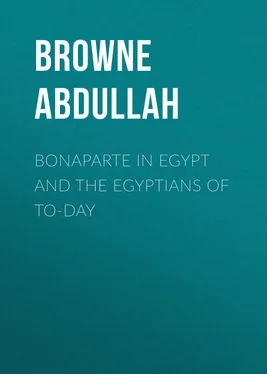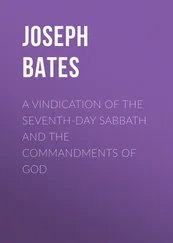Abdullah Browne - Bonaparte in Egypt and the Egyptians of To-day
Здесь есть возможность читать онлайн «Abdullah Browne - Bonaparte in Egypt and the Egyptians of To-day» — ознакомительный отрывок электронной книги совершенно бесплатно, а после прочтения отрывка купить полную версию. В некоторых случаях можно слушать аудио, скачать через торрент в формате fb2 и присутствует краткое содержание. Жанр: Историческая проза, foreign_antique, foreign_prose, foreign_language, на английском языке. Описание произведения, (предисловие) а так же отзывы посетителей доступны на портале библиотеки ЛибКат.
- Название:Bonaparte in Egypt and the Egyptians of To-day
- Автор:
- Жанр:
- Год:неизвестен
- ISBN:нет данных
- Рейтинг книги:4 / 5. Голосов: 1
-
Избранное:Добавить в избранное
- Отзывы:
-
Ваша оценка:
- 80
- 1
- 2
- 3
- 4
- 5
Bonaparte in Egypt and the Egyptians of To-day: краткое содержание, описание и аннотация
Предлагаем к чтению аннотацию, описание, краткое содержание или предисловие (зависит от того, что написал сам автор книги «Bonaparte in Egypt and the Egyptians of To-day»). Если вы не нашли необходимую информацию о книге — напишите в комментариях, мы постараемся отыскать её.
Bonaparte in Egypt and the Egyptians of To-day — читать онлайн ознакомительный отрывок
Ниже представлен текст книги, разбитый по страницам. Система сохранения места последней прочитанной страницы, позволяет с удобством читать онлайн бесплатно книгу «Bonaparte in Egypt and the Egyptians of To-day», без необходимости каждый раз заново искать на чём Вы остановились. Поставьте закладку, и сможете в любой момент перейти на страницу, на которой закончили чтение.
Интервал:
Закладка:
Haji A. Browne
Bonaparte in Egypt and the Egyptians of To-day
"In proportion as we love truth more and victory less, we shall become anxious to know what it is which leads our opponents to think as they do."
Herbert Spencer.Preface
Eight years have passed since I first conceived the idea of writing this book, but it was not until about two years ago that I was able to find time to put together a first rough outline of the form I wished it to take. In the interval I have been obliged from time to time to lay it aside altogether; and, at the most favourable times, have never had more than a few hours a week to devote to it. I had just completed what I had intended to be the last chapter, when events occurred that obliged me to rewrite it, and, that I might do so fitly, await the issue of those events. As the book now stands it is at best but a mere outline. A larger volume than this might easily be written upon each of several of the subjects I have but glanced at, yet I hope I have succeeded in giving a connected and intelligible sketch and one sufficient for the attainment of the chief object I have had in view, that of presenting the Egyptian as he really is to the many who, whether living in Egypt or out of it, have but few and imperfect opportunities of learning to understand him. For over thirty years I have given of all I have had to give, for the promotion of two objects: first, that Pan-Islamism, which I conceive to be the true interest of the Islamic world; and, secondly, the development of friendly relations between the Moslems of the East and the British Empire. How much, or how little, I have been able to accomplish towards the fulfilment of my aims it is impossible for me to estimate, but from boyhood I have had an earnest faith in the belief that right and truth must in the end prevail, and that he who works for these, or for what he honestly believes these to be, never works in vain.
Knowing the Egyptian as I know him, I cannot but think that he is greatly misunderstood, even by those who are sincerely anxious to befriend him. His faults and his failings are to be found at large in almost any of the scores of books that have of late years been written about him and his country; but, though not a few have given him credit for some of his more salient good points, yet none that I have seen have shown any just appreciation of him as he really is.
Cairo, May, 1907 .
CHAPTER I
THE STORY OF ONE HUNDRED YEARS
It was the 23rd of June, 1898. The day in Cairo had been unusually hot and oppressive, but as the sun went down, a cool wind from the north came blowing softly over the city.
I was then living in a little corner of the old town still wholly untouched by the ruthless hand of the "reform" that, in every other part, was busy marring with modern "improvements" the old-time charm of the "City of the Caliphs."
As midnight approached, I went up on the roof to enjoy the cool freshness and quiet of the night, and the stillness was almost unbroken. Now and then in the narrow lanes below, the watchmen, who in their drab-coloured coats and with long staffs and lanterns in their hands, made one think of Old London and the days of Dogberry, called to one another or challenged some belated passer-by, and at times a murmuring echo told of the restless traffic and turbulent life yet stirring in the carriage-crowded streets of the European quarters of the town, but otherwise the silence was undisturbed.
As I stood there, leaning on the parapet of the roof, my thoughts wandered back to the night, just one hundred years before, the 23rd of June, 1798, when possibly some wakeful citizen had stood, perhaps on the very spot on which I was then standing, and gazed upon the very scene, the same limited range of housetops and sidewalls, that was around me. That distant night is one of which the historians of the country make no mention, and yet it is one most worthy of note, as having been at once one of the most peaceful and one of the most memorable Cairo has ever known. Peaceful, for, when not lured from his slumbers by one of the night-quenching festivals he so dearly loves, the Cairene is an early and a sound sleeper, and being then, as now, blessed with an easy-going conscience and unbounded faith in the beneficence of Destiny, we may be certain that on that night he slept the sleep of the just man who is weary. Nor was that night less memorable than peaceful, for little as he could foresee it, it was the last for over a century of time on which the Cairene was to sleep so free from care or thought of the morrow. For, while the city slumbered, away in the villages on the banks of the Nile, sleepers were being unwontedly awakened and dismayed by the sounds of horsemen hurrying through the night with the rushing haste of men who are bearers of tidings of life and death.
Onward, onward they came, these messengers of the night, weary with their long forced ride from Alexandria, the city of the sea, which they had left the day before. Onward, onward as rapidly as they could press forward the steeds that, as one after another failed, were replaced by others seized from the nearest stables "for the service of the State." Onward and onward on their trying ride, spreading as they went the news they bore, news that murdered the sleep of those who heard it, and flung a pall of panic fear over the land.
They were still on the road when the Cairenes rising, as all good Mahomedans should, with the first dawn of day, proceeded to the duties of the morning with the leisurely diligence that is one of their characteristics. But long before mid-day the messengers had discharged their task, and the fateful news they had brought was being discussed throughout the town. It was news that, to the Cairene, was fraught with most direful possibilities, for it was news that a fleet of English ships of war had arrived at Alexandria, and that the Governor of the town, feeling utterly incapable with the scanty resources at his disposal, of offering any effective resistance to a hostile landing, had sent to beg for immediate assistance in men and munitions of war. Many and fervent were the prayers said in the mosques that day, and loud and deep were the anathemas launched against the foreigner who was at their gates. It is not surprising that it should be so, for, of all evils he could imagine, a foreign invasion was, to the Cairene, as to the people of Egypt generally, the one most suggestive of personal loss and misery.
Exactly one hundred years had passed since that day, and the dying hours of that century of time left the Egyptian, as its opening hours had found him, distrustful of the English, rejecting their friendship, and cursing them as foes. That it should have been thus, is one of the problems that perplex those who attempt to know or understand the Egyptian, and as I thought of these things, it seemed to me that living as I then was amongst the most conservative class of the people, the class that still prides itself on living the life its fathers and grandfathers led, and holds all things foreign to be abominations, and yet meeting from day to day with the modern half-Europeanised citizens, and being myself almost an Oriental in thought and sympathy, I could read the story of that one hundred years and comprehend the feelings of the people through all its incidents, better perhaps than any other European, and that by sketching the history of that century as it appears to me, I might help others to understand the people and their history better, and thus aid in promoting the mutual goodwill that is as essential to the interests of the Egyptian himself, as to those of the great army of foreigners who are dwellers in his hospitable land.
As told by the writers of to-day, the history of Egypt extends over nearly seven thousand years – three score and ten centuries – just one for every year allotted by the Psalmist to man as the period of his life. But of all that great stretch of time the hundred and odd years lying between the fateful 23rd of June in 1798 and the present day, although unfortunately the materials available for a study of it are scant and for the most part unreliable, has more of human interest as a chapter in the history of mankind, than all the long ages that preceded it.
Читать дальшеИнтервал:
Закладка:
Похожие книги на «Bonaparte in Egypt and the Egyptians of To-day»
Представляем Вашему вниманию похожие книги на «Bonaparte in Egypt and the Egyptians of To-day» списком для выбора. Мы отобрали схожую по названию и смыслу литературу в надежде предоставить читателям больше вариантов отыскать новые, интересные, ещё непрочитанные произведения.
Обсуждение, отзывы о книге «Bonaparte in Egypt and the Egyptians of To-day» и просто собственные мнения читателей. Оставьте ваши комментарии, напишите, что Вы думаете о произведении, его смысле или главных героях. Укажите что конкретно понравилось, а что нет, и почему Вы так считаете.












